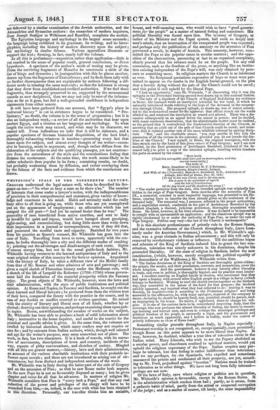are followed by a similar examination of the Jewish authorities,
and the Alexandrine and Byzantine authors : the researches of modern inquirers, from Joseph Scaliger to Wilkinson and Rosellini, completes the section.
The Egyptian language and mythology in the largest sense succeeds ; the language being exhibited in its grammar, its writing, and its hiero- glyphics, including the history of modern discovery upon the subject ; the mythology in similar fulness. Various appendixes illustrate or support the text ; forming, in fact, nearly half the volume. As all this is preliminary—exposition rather than application—little is yet reached in the sense of popular result, general conclusions, or direct hypothesis. A specimen of the author's mode of testing may be given. From the surviving fragments of Manetho he constructs a table of the list of kings and dynasties ; in juxtaposition with this he places another, drawn up from the fragments of Eratosthenes; and he.finds them tally with no further discrepancies than are explainable by authors following a dif- ferent mode in treating the same materials; so that the inference is strong that they drew from established and credited authorities. If we find these fragments, thus strangely preserved to us, supported by the monumental records as now deciphered, then we may not only be sure of the informa- tion as far as it goes, but feel a well-grounded confidence in independent statements from either source.
It will have been gathered from our account, that " Egypt's place in universal history" is not in strictness begun to be considered. " Pre- liminary," no doubt, the volume is in the sense of preparation ; but it is also an independent work,—a review of all the authorities that bear upon ancient Egypt, and a treatise on her language and mythology. To what length the entire work may extend, and what may be its character, we cannot tell. From indications we infer that it will be elaborate, and a popular specimen of German historical disquisition, of the best kind ; thoroughly exhausting whatever it touches—presenting every fact that bears upon the subject, and almost every thought of the writer—exten- sive in learning, acute in argument, and, though rather diffuse from the elaboration of the subjects and the qualifying passages, yet not unattrac- tive from the naturalness of the style and the conscientious feeling that dictates the exuberance. At the same time, the work seems likely to be rather scholastic than popular in its form ; containing results, no doubt, but probably weakening them by diffusion, and rather overlaying them by the fulness of the facts and evidence from which the conclusions are drawn.


















 Previous page
Previous page